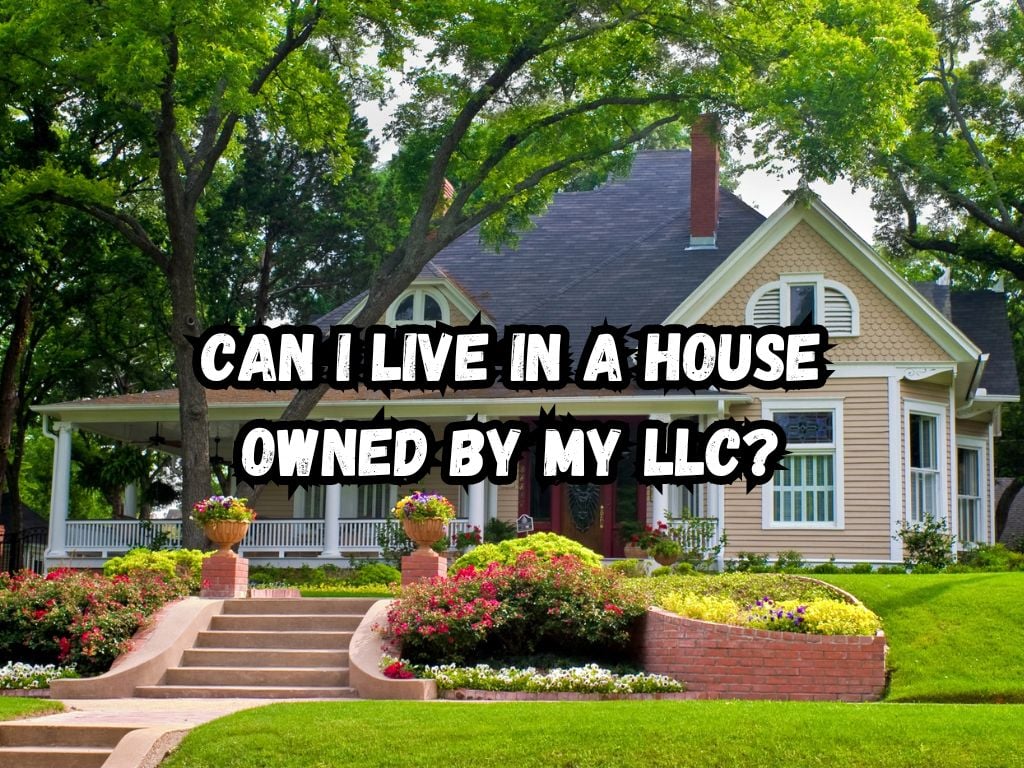In the complex world of real estate and business law, navigating ownership structures can be a daunting task.
This holds especially true when considering the possibility of living in a house owned by a Limited Liability Company (LLC) that you own. So, Can I live in a house owned by my LLC?
This article aims to shed light on this topic, exploring legal and financial implications and guiding potential homeowners through the process.
What is an LLC?
A Limited Liability Company, or LLC, is a business structure that combines elements of both corporations and partnerships. One of its key features is that it offers its owners protection against personal liability.
This means that, in the face of business debt or lawsuits, the personal assets of the owners, often referred to as members, are typically protected.

Can I Live in a House Owned by My LLC?
LLCs are legally capable of owning real estate, including residential properties. This arrangement can offer benefits like asset protection, privacy, and potential tax advantages.
Many choose this route primarily to shield their personal assets from business-related legal issues.
Residential Properties and LLCs
While commonly used for commercial properties or rental businesses, LLCs can also own residential properties.
However, when these properties serve as the owner’s residence, several additional considerations come into play. These mainly revolve around legal compliance and financial implications.
Legal Aspects of Living in an LLC-Owned House
Living in a house owned by your LLC is possible, but it requires careful planning to stay within legal boundaries.
The key is to ensure that the arrangement does not violate state laws or the operating agreement of the LLC itself.
It’s essential to establish a clear lease agreement between you as an individual and your LLC, treating the occupancy as you would with any tenant relationship.
Financial Implications
Residing in an LLC-owned property comes with its financial complexities. For example, obtaining a mortgage for a house owned by an LLC might be more challenging and potentially more expensive than for a personal home.
Insurers also view residential properties owned by LLCs differently, which can affect your coverage options and costs. Taxes are another critical area, as the IRS scrutinizes personal use of business assets.
Advantages of Living in an LLC-Owned House
Despite these complexities, there are clear benefits. Living in an LLC-owned house can enhance your privacy, as the property records list the LLC rather than your personal name.
This arrangement can also offer tax benefits under certain conditions, and most importantly, it provides an additional layer of protection for your personal assets against lawsuits or debts incurred by the business.
Risks and Complexities
However, it’s not without its downsides. Mixing personal and business assets can undermine the LLC’s protection against personal liability, making it vital to keep strict financial separation.
The IRS might also view the arrangement with skepticism, potentially leading to audits if not properly managed.

Steps to Legally Living in an LLC-Owned Property
To establish a valid and legal arrangement for living in an LLC-owned house, start by consulting with legal and financial advisors to understand the nuances of your situation.
Set up a formal lease agreement between yourself and the LLC, outlining the terms just as you would with an unrelated tenant.
Maintain diligent financial records to demonstrate the separation between personal and business expenses. This preparation helps ensure compliance with state laws and IRS regulations.
Frequently Asked Questions
How does living in a house owned by my LLC affect liability protection?
Living in an LLC-owned house can still offer liability protection, provided there is a clear separation of business and personal activities. Proper documentation and adherence to legal formalities are crucial.
Can I legally rent a property to myself through my LLC?
Yes, you can legally rent a property to yourself through your LLC. This arrangement should be formalized with a lease agreement that specifies rent terms comparable to market rates.
What are the tax benefits and drawbacks of living in an LLC-owned house?
The tax benefits can include potential deductions related to property expenses. However, personal use of a business property can complicate tax filings, requiring careful handling.
How to maintain the separation between personal and business finances when living in an LLC-owned property?
Maintaining separation requires diligent accounting, separate bank accounts for personal and business finances, and a formal lease agreement for the residential use of the property.
Are there any long-term implications for my investment strategy if I live in a house owned by my LLC?
Living in an LLC-owned house can impact your investment strategy, particularly regarding asset protection and estate planning. It’s important to consider how this arrangement fits into your broader financial goals.
Conclusion
Living in a house owned by your LLC is a strategy that comes with both potential benefits and significant challenges. It requires navigating legal requirements, understanding financial implications, and maintaining rigorous boundaries between personal and business entities.
With careful planning and professional advice, it’s possible to leverage the advantages of this arrangement while minimizing the risks.
By understanding the intricacies of living in an LLC-owned house, owners can make informed decisions that serve their personal and business interests. Professional guidance is key in these situations to navigate the complex intersection of real estate, business law, and taxation effectively.


 Tags:
Tags:










